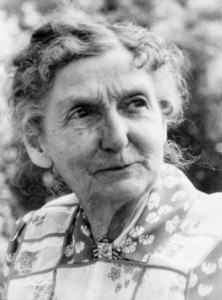
When Nannie Alderson and her husband, Walt, immigrated to Montana in 1883, they were among the first wave of settlers in eastern Montana’s nascent cattle kingdom. A Bride Goes West, Alderson’s memoir of her years as a rancher’s wife, is consistently listed as one of the best books about Montana. In it, she famously paraphrased Theodore Roosevelt, stating that Montana was “a great country for men and horses, but hell on women and cattle.” The story of her transition from a life of Southern privilege to the hardships of ranching on the Northern Plains has come to symbolize the experience of the pioneer woman in Montana.
Alderson grew up in a wealthy West Virginia family. She met Walt while visiting relatives in Kansas in 1882, and they were married in the spring of 1883. Possessed by a “feverish optimism” about the prospects of cattle ranching in Montana, the couple settled on a homestead south of Miles City. In her memoir, Alderson recalls an overwhelming sense of possibility: “Everyone, it seemed, was making fabulous sums of money or was about to make them; no one thought of losses; and for the next year my husband and I were to breathe that air of optimism and share all those rose-colored expectations.”